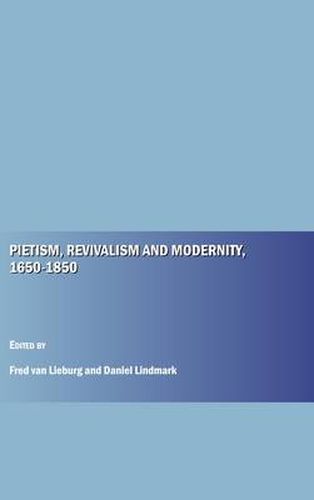Readings Newsletter
Become a Readings Member to make your shopping experience even easier.
Sign in or sign up for free!
You’re not far away from qualifying for FREE standard shipping within Australia
You’ve qualified for FREE standard shipping within Australia
The cart is loading…






Pietism can be understood either as a specific German theological tradition emanating from late seventeenth-century reformers as Spener and Francke or as a wider range of practical piety characterising early modern movements as Protestant Puritanism and Methodism as well as Catholic Jansenism. Trying an inclusive definition, an international network programme was set up, resulting in a first conference in the Netherlands in 2004, which addressed the question whether Pietism was to be seen as a consequence of or a reaction to confessionalisation in the Reformation era.A similar approach was chosen for a second conference, held in the Swedish university town of Umea on November 17-18, 2005. Should Pietism be perceived as a promoter of or a reaction against modernity? Are revivals and awakenings to be seen as inherent components of Pietism? Or should they rather be viewed as new sociological phenomena integrated into Pietism on a later stage? Which components of pious theology and practice were applied and what function did they serve in clerical and civil discourse? Either way, how do revivals relate to Pietism, and how do they relate to Enlightenment?This volume presents the proceedings of an inspiring conference, taking a further step in the ‘globalisation’ of Pietism studies, as is demonstrated here in particular by the power of research in the Nordic area. Above all, this collection of papers helps to understand Pietism and revivalism as attempts to resist the breakthrough of secularizing tendencies in the modern world. While doing so, they themselves at the same time were modern in building up a counteroffensive of rechristianization, using all contemporary means of communication and organization in the public sphere, adapting their own traditions to new political and cultural contexts, and creating constructions of the religious past.
$9.00 standard shipping within Australia
FREE standard shipping within Australia for orders over $100.00
Express & International shipping calculated at checkout
Pietism can be understood either as a specific German theological tradition emanating from late seventeenth-century reformers as Spener and Francke or as a wider range of practical piety characterising early modern movements as Protestant Puritanism and Methodism as well as Catholic Jansenism. Trying an inclusive definition, an international network programme was set up, resulting in a first conference in the Netherlands in 2004, which addressed the question whether Pietism was to be seen as a consequence of or a reaction to confessionalisation in the Reformation era.A similar approach was chosen for a second conference, held in the Swedish university town of Umea on November 17-18, 2005. Should Pietism be perceived as a promoter of or a reaction against modernity? Are revivals and awakenings to be seen as inherent components of Pietism? Or should they rather be viewed as new sociological phenomena integrated into Pietism on a later stage? Which components of pious theology and practice were applied and what function did they serve in clerical and civil discourse? Either way, how do revivals relate to Pietism, and how do they relate to Enlightenment?This volume presents the proceedings of an inspiring conference, taking a further step in the ‘globalisation’ of Pietism studies, as is demonstrated here in particular by the power of research in the Nordic area. Above all, this collection of papers helps to understand Pietism and revivalism as attempts to resist the breakthrough of secularizing tendencies in the modern world. While doing so, they themselves at the same time were modern in building up a counteroffensive of rechristianization, using all contemporary means of communication and organization in the public sphere, adapting their own traditions to new political and cultural contexts, and creating constructions of the religious past.